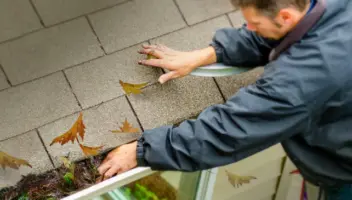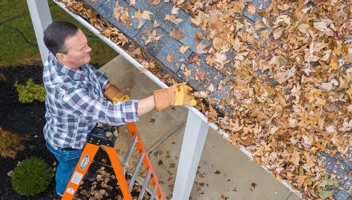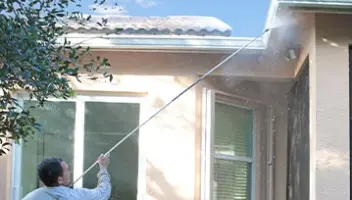How to Clean Rain Gutters

Many homeowners neglect their gutters until they notice a major problem like overflowing rain water or a flooding basement. It is important to perform routine maintenance on your gutters, which includes cleaning them regularly.
Here at LeafFilter, we do not recommend homeowners tackle eavestrough cleaning on their own. We’ll clean them for you before installing our gutter protection system so that you don’t have to climb a ladder or worry about disgusting clogs.
However, if you’d rather tackle cleaning the gutters yourself, it’s important to follow these steps so that you can stay safe and efficiently complete the job.
Step 1: Get the Right Gear
There are a number of things you might encounter once you begin eavestrough cleaning, like hard to reach clogs and pests. It is also important to take the right safety precautions so that you don’t become one of the hundreds of thousands of Americans who fall off ladders each year.
You’ll want to be fully prepared when cleaning your gutters to be as safe and efficient as possible. Because of this, there are many tools you’ll need to clean your gutters:
- Safety protection like heavy duty gloves, goggles, dust mask, rubber soled shoes, and long-sleeved shirt
- Fiberglass or aluminum ladder, and ladder stabilizer
- Gutter scoop or small garden trowel
- Hose with nozzle attachment for minor clogs
- Auger for major clogs and hard to reach downspout blockages
- Tarp, drop cloth, or small bags to dispose of debris
- Rain gutter sealant
Step 2: Scoop the leaves and debris out of gutters and downspouts
Using a gutter scoop or small garden trowel, carefully scoop the leaves and debris out of your rain gutters.
Here are some tips to help you when cleaning your gutters:
- Wait for a few dry days in a row before cleaning so that leaves and debris have a chance to dry out. They will be lighter and easier to scoop out.
- Start at the low end of your gutters and work your way up.
- Don’t lean against your gutters so that they don’t collapse or get crushed.
- Work in sections no wider than the length of your arm to prevent ladder falls.
- Be careful how you dispose of the debris so that it doesn’t splash your siding or get stuck in your landscaping.
Step 3: Fix any rain gutter problems
Aside from clogs, some come common rain gutter problems include leaking seams, rotting fascia board, misalignment, and detachment. It is important to fix these problems before they cause larger problems in your home like mold, roof damage, foundation cracks, and flooding.
Step 4: Test gutters with a hose
Before putting your equipment away, it’s important to test your rain gutters. Hose some water into your rain gutters starting at the highest point and watch to make sure it’s properly diverted all the way through your gutters, and away from your foundation. If any water puddles in your rain gutters, or if it is slow to come out, you still have a clog somewhere.
Repeat step 2 until all water is diverted properly away from your home.
Step 5: Repeat every 4-6 months
Eavestrough cleaning is a temporary solution to a permanent problem. Homeowners must tackle the dirty, disgusting job of eavestrough cleaning every four to six months in order to prevent serious problems like foundation cracks and home flooding. You may decide to hire a professional instead of cleaning the gutters yourself, but this can become costly over time.
There is a better way. LeafFilter gutter protection is the only permanent solution to gutter clogs.
Our patented design, featuring stainless steel micro mesh backed by a frame of uPVC, is the best on the market. It will never let anything but water in your gutters. Our product is installed directly onto your existing gutters, meaning it will never disturb your roof or shingles like other eavestrough protection products.
With LeafFilter, you’ll enjoy all the benefits of Eavestrough Protection Perfection with our No Clogs guarantee and lifetime, transferable warranty.


